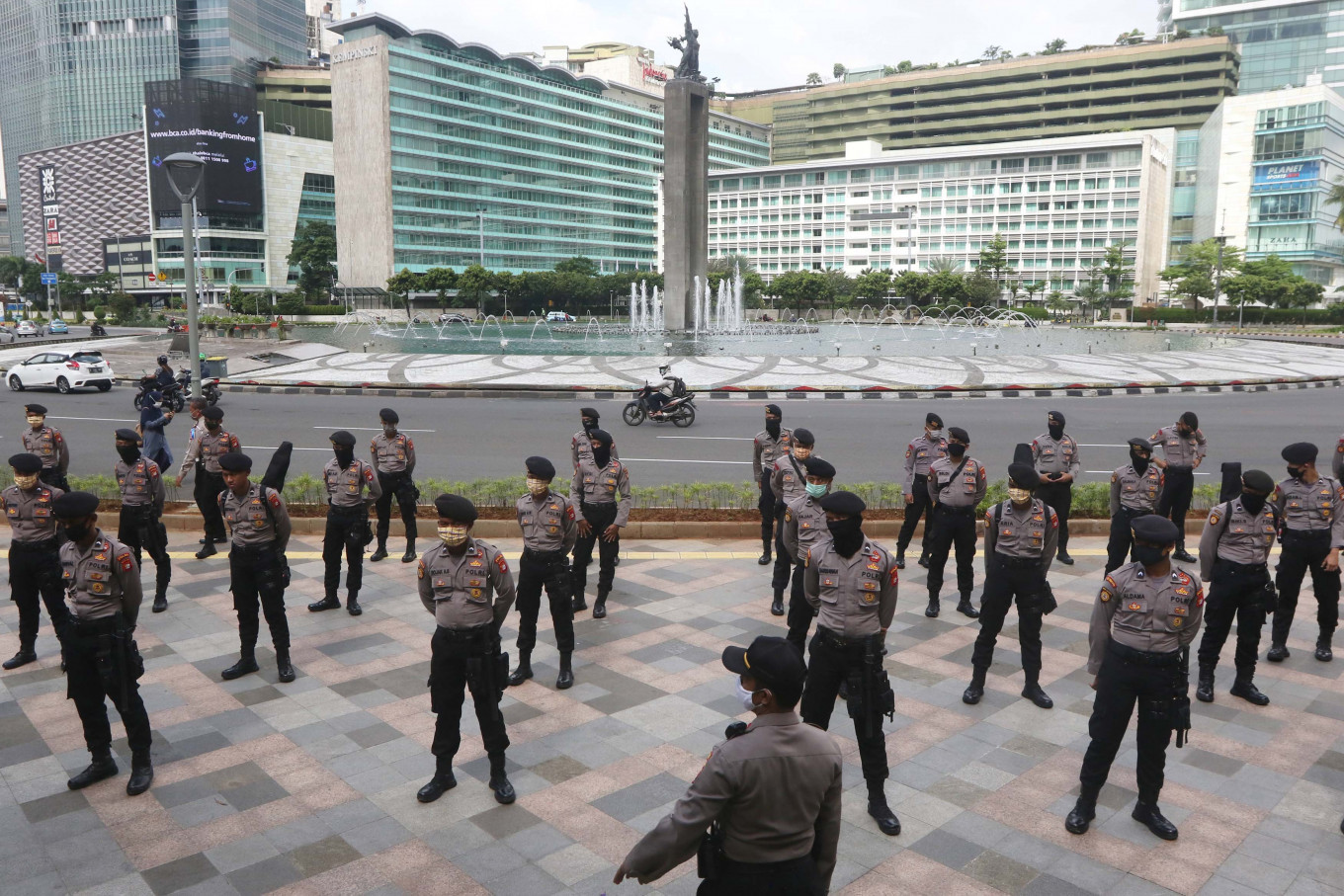Popular Reads
Top Results
Can't find what you're looking for?
View all search resultsPopular Reads
Top Results
Can't find what you're looking for?
View all search resultsFears of repression grow in virus-crippled Indonesia
Change text size
Gift Premium Articles
to Anyone
A
ctivists have raised the alarm over a growing climate of fear in Indonesia following the arrests of a number of people critical of the government as it scrambles to weather the social and economic fallout of the COVID-19 pandemic.
In Jakarta, a government critic was arrested and questioned for 33 hours after his WhatsApp account, which he claimed was hacked, broadcast an inflammatory message calling for nationwide looting. In Malang, East Java, three students were arrested on charges of vandalism and “inciting people to fight against capitalism”.
The incidents, the activists said, were indications that the state was now more inclined to resort to acts of repression and intimidation to silence critics, a trend that has put the President Joko "Jokowi" Widodo's credentials as a democratic leader in time of crisis in question.
“The President’s commitment to upholding the democratic system during the [COVID-19] crisis should be evaluated,” said Wahyudi Djafar, the deputy director of the Institute for Policy Research and Advocacy (ELSAM).
In the past few days, human rights groups have rallied behind Ravio Patra, an independent researcher known for his critical tweets and op-ed on government policies who was arrested by the police after reporting that his WhatsApp account had been hacked and found to have broadcast provocative messages.
Ravio and a Dutch citizen identified as RS were arrested by the Jakarta Police between 9 p.m. and 10 p.m. in Menteng, Central Jakarta, on Wednesday, shortly after he announced on his twitter account @raviopatra that his WhatsApp account had been hacked, although he later recovered it.
Read also: The curious case of Ravio Patra: Why Indonesian cyberspace is a dystopian nightmare
Human rights organizations believe the hacking was an attempt to frame Ravio as a provocateur calling for nationwide riots on April 30. Labor groups have previously threatened to protest the omnibus bill on job creation on the same date, although the plan was later cancelled.
National Police spokesperson Sr. Comr. Argo Yuwono confirmed the arrest of the two people in a press conference on Thursday evening, saying that Ravio was arrested as he was about to enter a vehicle belonging to the Dutch Embassy. Ravio was released on Friday but is still facing incitement charges, while the police are trying to trace his digital activities and authenticate his hacking claim.
Aldo Kaligis of Amnesty International Indonesia has called on the police to fully investigate the case. “Ravio’s arrest is believed to be linked to his criticism of the government. If proven true, there should be an independent, in-depth investigation and legal action against the perpetrators of the hacking and his arrest,” he said.
In Malang, three student activists, who often take part in Kamisan protests — a weekly silent protest held every Thursday to demand state action on human rights abuses — and who are involved in advocating for Tegalrejo farmers in Malang regency that are defending their land against a corporation, were arrested for vandalism.
The Surabaya Legal Aid Institute (LBH) criticized their arrest, saying they were apprehended by the police and named suspects based on mere speculation. "We demand the three activists be released immediately because their arrests were flawed. This is a violation of justice," he said.
In Yogyakarta, the local chapter of the Indonesian Forum for the Environment (Walhi Yogyakarta) in Kotagede, claimed that local authorities had dispersed one of their meetings on the grounds that it violated physical distancing rules.
The activists said the meeting had followed the prescribed protocols and was allowed to be held before locals and members of the police and the Indonesian Military (TNI) came to the office to disband them.
Yogyakarta-based charity group Jogja Food Solidarity (SPJ) has claimed that the police have been monitoring its charity work in distributing food, facemasks, health supplements and hand sanitizer to low-income informal workers in the province.
Researcher at the Centre for Strategic and International Studies (CSIS) Noory Okthariza deplored law enforcement officials for what he called repressive action, arguing that the government’s hostility toward its critics would only backfire.
“These kinds of things only worsen the situation at a time when the police should focus on [enforcement of] large scale social restrictions [PSBB],” adding that the incidents could reflect that the government’s was learning toward a security focused approach to handle criticism of its policies to contain COVID-19.










